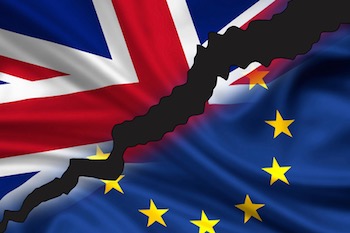Brexit has been postponed and may be delayed further. What are the implications for owners of IP rights and U.S. IP practitioners?
 What has happened in the past week?
What has happened in the past week?
In summary, Brexit has been postponed and will not now happen at midnight on March 29, 2019.
The UK’s House of Commons has twice voted against the Withdrawal Agreement and Political Declaration, which were agreed between the UK Government and the European Union in November 2018. It is not clear at this stage whether Members of Parliament (MPs) will support the Agreement if and when it is put before them again.
The EU has therefore agreed to the UK’s request to postpone Brexit day (the day when the UK leaves the EU).
When will the UK now leave the EU?
We don’t know. There are several possibilities.
If the House of Commons approves the Withdrawal Agreement by this Friday, March 29, the EU has agreed to postpone Brexit Day until May 22, 2019 to provide enough time for the UK to prepare. (This is the day before elections to the European Parliament, which the UK will not take part in.)
If, however, the House of Commons does not agree the Withdrawal Agreement, the EU has set a deadline of April 12 for the UK to indicate how it wishes to proceed. During this time, the UK could request a further extension or cancel Brexit by unilaterally revoking its declaration under Article 50. If it does neither of these things, then it will leave the EU on April 12 without a deal (the so-called no deal).
It is possible that during this time MPs will vote to reopen negotiations, hold another referendum or force the government to call a General Election to resolve matters. Any of these outcomes would likely lead to a request for a further postponement of Brexit, probably for many months at least.
Why does the deal matter?
The Withdrawal Agreement provides for a transitional period of up to 21 months, during which EU and UK laws will remain aligned and a long-term trade relationship will be negotiated.
If the UK leaves without a deal, there will be no transition period and considerable uncertainty over, for example, tariffs and regulatory regimes including those affecting IP rights. The main business groups and trade unions and a majority of MPs oppose leaving without a deal.
What does the date mean for IP?
The UK Government updated its guidance on IP and Brexit on March 22 2019.
The most important point for IP rights holders is that on Brexit day, whenever that is, unitary EU rights (notably EU trademarks and registered Community designs) will cease to cover the UK, unless there is an agreement to the contrary.
Title IV of the Withdrawal Agreement provides that these unitary rights will continue to cover the UK during the transition period, after which the UK will create comparable rights “free of charge.” The Agreement also covers issues such as priority and registration procedure for these comparable rights. However, as stated above, it is far from clear whether this Agreement will be approved and take effect.
If the UK leaves the EU without a deal, the UK Intellectual Property Office will create corresponding UK trademark and design rights “with minimal administrative burden” effective on Brexit day, according to Government no-deal guidance.
The EUIPO has also published guidance on a no-deal Brexit, including regarding representation for EU trademarks and registered Community designs, though it has not been updated since Brexit was postponed and still refers to the March 29 date. Importantly, owners of these rights with a UK representative need to check what arrangements are in place to act in proceedings before the EUIPO in the event of no deal (there may be no need to do anything if there are no pending proceedings). A number of UK firms have set up new offices in other EU member states or made other arrangements so they can continue to represent clients.
WIPO has published information regarding the Madrid System and Hague System in the event of no deal.
Other IP issues the UK Government has provided guidance on in the event of no deal include geographical indications, copyright and exhaustion. On the latter, the UK is proposing to retain regional (European Economic Area, or EEA) exhaustion of rights, even if the EU does not reciprocate. This means that IP rights owners will not be able to stop parallel imports from the EEA into the UK, but rights owners in EEA member states may be able to stop parallel imports without their consent coming from the UK. (The EEA comprises all EU member states, plus Iceland, Liechtenstein and Norway.)
If you are affected by any of these issues, the information published by the Chartered Institute of Trade Mark Attorneys, as well as other IP associations and UK law firms, is strongly recommended.
What about patents?
The UK is remaining part of the European Patent Organization, so there will be no change to registered or pending European patents (which are often referred to as a bundle of national rights). The EPO covers 38 countries, including all 28 (current) EU member states. UK patent attorneys will continue to act before the EPO and disputes involving European patents will continue to come before the UK courts.
The UK Government has said it still intends to take part in the proposed Unified Patent Court (including hosting one of the three branches of the central division) and unitary patent. The UK ratified the UPC Agreement on April 26, 2018. However, it is not clear whether this will be possible. In any case, the UPC and unitary patent are currently on hold pending a challenge before Germany’s constitutional court. Whatever the outcome of that, most patent practitioners expect that the proposed system will need to be re-negotiated for the UK to take part. Don’t expect any news soon.
There are some aspects of patent law that are affected by Brexit, the main one being Supplementary Protection Certificates (SPCs) for patented pharmaceutical and plant protection products. In the short term, the UK plans to maintain the current SPC framework including in the event of no deal (see the guidance here).
What will happen in the future?
The UK government’s intention is to negotiate trade deals with major trading partners once it leaves the EU, and any agreed transitional period is over. To this end, the UK and U.S. governments have held discussions since July 2017, as set out by the U.S. Trade Representative (USTR).
In February 2019, the USTR published a “Summary of Specific Negotiating Objectives”. The section on intellectual property covers topics such as protection of IP rights, technological protection measures, cyber theft and piracy, market access, the TRIPS Agreement and Public Health, and enforcement.
Most of these matters are likely to prove uncontroversial. However, the aim to “prevent the undermining of market access for U.S. products through the improper use of the UK’s system for protecting or recognizing geographical indications, including any failure to ensure transparency and procedural fairness, or adequately protect generic terms for common use” may get some pushback.
There are 87 protected food names in the UK, which are due to remain protected after Brexit. They include: Cornish pasty, Stilton Blue cheese, West Country Farmhouse Cheddar cheese, Cornish clotted cream, Scottish wild salmon, Scotch beef, traditional farm fresh turkey, Welsh lamb, Jersey royal potatoes, Melton Mowbray pork pie, traditional Cumberland sausage and Welsh laverbread.
What happens next?
It’s very hard to say. The House of Commons is due to have several debates this week. This could lead to the Withdrawal Agreement being approved, or some other decision being made.
A growing number of MPs favor holding another referendum, including the option of remaining in the EU. A march in support of this aim was attended by an estimated 1 million people in London on March 23 (including this author). The government opposes this option at present.
Meanwhile, more than 5 million people (just over 10% of the UK electorate) have signed an online petition calling on the Government to “revoke Article 50 and remain in the EU.” This option is not supported by the Government or by many MPs at this stage.
Finally, there is speculation that Prime Minister Theresa May could resign, resulting in a new government being formed and—presumably—a new Brexit policy being proposed.
All of these outcomes would likely lead to further delays to Brexit, or even its cancellation.

![[IPWatchdog Logo]](https://ipwatchdog.com/wp-content/themes/IPWatchdog%20-%202023/assets/images/temp/logo-small@2x.png)

![[Advertisement]](https://ipwatchdog.com/wp-content/uploads/2024/04/Artificial-Intelligence-2024-REPLAY-sidebar-700x500-1.jpg)
![[Advertisement]](https://ipwatchdog.com/wp-content/uploads/2024/04/Patent-Litigation-Masters-2024-sidebar-700x500-1.jpg)

![[Advertisement]](https://ipwatchdog.com/wp-content/uploads/2021/12/WEBINAR-336-x-280-px.png)
![[Advertisement]](https://ipwatchdog.com/wp-content/uploads/2021/12/2021-Patent-Practice-on-Demand-recorded-Feb-2021-336-x-280.jpg)
![[Advertisement]](https://ipwatchdog.com/wp-content/uploads/2021/12/Ad-4-The-Invent-Patent-System™.png)






Join the Discussion
No comments yet.